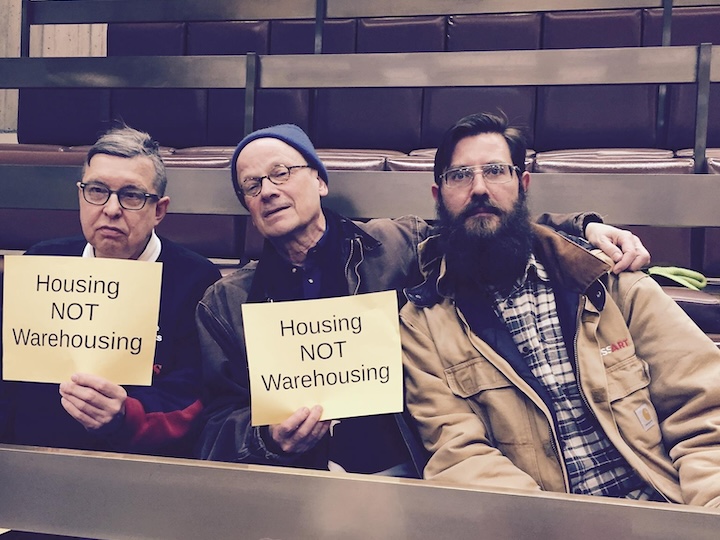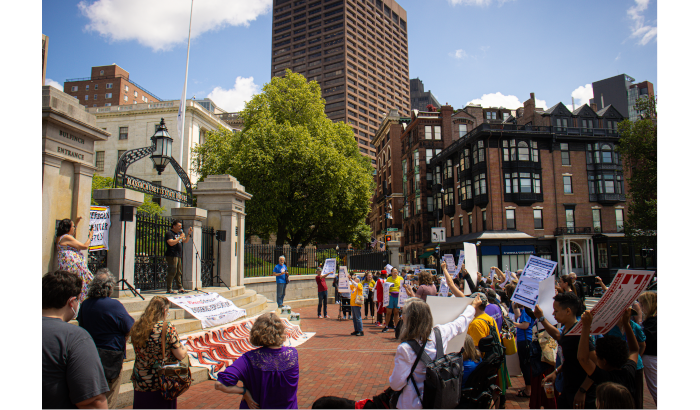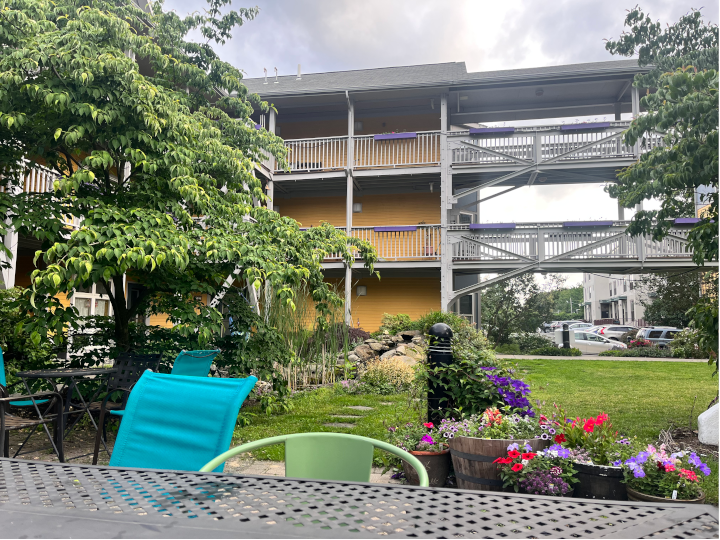An interview with First Church Shelter Director Jim Stewart
“There’s nowhere near the number of units needed to try to help those people who can’t make the kind of income you have to make to compete in the real estate market the way it exists in Cambridge, and Somerville, and Boston.”
Cambridge Unhoused is a series of articles, columns, explainers, and informational graphics by the Boston Institute for Nonprofit Journalism documenting homelessness funding and services in Massachusetts with particular attention paid to Cambridge. Since the topic is complex and ever-changing, we are publishing multiple short focused pieces that highlight specific issues or stakeholders but that also connect with other coverage for this project. Media produced for the Cambridge Unhoused series is distributed through the MassWire news service of BINJ and can be found together at binjonline.org.
Jim Stewart remembers the opening of the homeless shelter at the First Church in Cambridge shortly after he was hired in November 1987. Despite the facility’s shortcomings, it was a glorious event.
“First, we were operating just in sort of a big basement room, where we set up cots every night.” Stewart was chairing the church’s Committee on the Human Shelter Emergency at the time. “We thought, at the beginning, Oh, let’s just get people off the street [and] throw them on a cot, you know, it beats being outside.”
He continued, “Michael Dukakis was governor, so everybody thought, Oh yeah, we’re going to clear this problem up real fast. … But it didn’t work out that way.”
It certainly didn’t—for the state, or for the church. The person who they hired to run the shelter didn’t work out, and Stewart took over as the director. Nearly 40 years later, he remains one of the staunchest and most vocal advocates for providing housing to the homeless in the region, while the shelter has been transformed into a refuge for its guests.
Looking back, Stewart said the shelter’s humble beginnings were all part of the learning experience. “It’s kind of hard for people to start thinking of themselves as people who are worth caring about if they’re basically just stacked up like cordwood in the middle of a big room,” he said.
Today, the 14 men staying at the shelter sleep in bunks, and have access to personal storage, showers and other bathroom facilities, a common area, and a kitchen, according to the First Church. They also get cooked meals and coaching.
The average stay for each guest is about seven months, during which they’re given the opportunity to find housing, work, health services, and “any other qualities of a good life they may need to get back on their feet.” The men staying at the shelter are admitted via referrals from qualified professionals, and are required to be clean and sober.
Before coming to Cambridge, Stewart, a graduate of the University of Massachusetts and Harvard Divinity School, helped open and operate a shelter in a United Church of Christ church in Salem. He is also a founding member of the UCC Welfare Working Group, as well as the Massachusetts Coalition for the Homeless and Housing Now!, groups that brought over 100,000 people to Washington, DC in 1989 to demand more federal funding for affordable housing.
Those early years helped shape and mold him into the advocate he is today, Stewart said.
“When I was an idiot adolescent I just blundered around, but some people in a church on the North Shore took me in and they tolerated a lot of goofiness from me and they eventually got me to pay attention to what was happening in my life,” Stewart said. “I decided I had to be respectful and honor the traditions that community instilled in me.”

He added, “I would be dishonoring the people who invested in me their time, their energy, and their generosity if I just sort of took my Harvard education and went and just did okay by me but didn’t give a rat’s ass about anybody else.”
That community, according to Stewart, expected him to stand for a set of values. “Nobody expects me to stand in front of a tank in Tiananmen Square or anything,” he said. “But the faith community I’m a part of says, Stand up [and] take some abuse, be sneered at a little, be called unrealistic, be chuckled at, but stay true to what you believe in and what the community you’re a part of has taught you.”
For Stewart, that meant demanding housing for the most vulnerable. Unfortunately, he said, it has been an uphill battle from the start, mostly because city, state, and federal officials didn’t make the critical investments needed to effectively tackle homelessness, Stewart said.
“Everybody thought, Oh well, we’ll just partner with the nonprofits and the religious community and we’ll just do it that way,” Stewart said. “It’s basically using like a bake sale model: we don’t have to invest in the things that are going to make a difference and improve the problem, we’ll just have these little projects, and we’ll partner with them and we’ll throw them a little start up money and that should take care of everything.”
Expiring use
The particular problem that needed attention back then is the same cardinal stressor today—the lack of affordable housing, Stewart said. If anything, the situation has only worsened over the past five decades.
“There’s been a steady inexorable decline in the stock of affordable housing for poor and working people since the end of the Carter administration,” Stewart said.
In 1978, President Jimmy Carter appropriated the modern-day equivalent of several hundred-billion dollars to the Department of Housing and Urban Development (HUD). Since then, the numbers have dropped. In 2015, the Obama administration requested $47 billion. And according to the Center on Budget and Policy Priorities, between 2010 and 2016, federal funding for public housing fell by $1.6 billion, or 21%, while funding for HOME programs dropped by $1 billion, or 52%.
HOME constitutes the largest federal block grant to state and local governments designed exclusively to create affordable housing for low-income households, according to HUD. The program provides formula grants to states and localities that communities use for things like building, buying, and rehabilitating affordable housing for rent or homeownership or to provide direct assistance to low-income people.
Meanwhile, affordable housing stock has also declined due to houses and apartments being converted to market-rate units, Stewart said. As the Boston Tenant Coalition explains it, expiring-use developments are privately owned but publicly subsidized housing developments that can be converted to market rents when the mortgage is paid off or the subsidy contract expires. (Read more about public housing privatization in Massachusetts here.)
“Even the units that were created 30 [or] 40 years ago, they’re falling into the private sector and they’re becoming market-rate housing,” Stewart said. He noted that the trend makes it impossible to keep up with demand.
“You just can’t really get a handle on the number of units that are needed because we’re constantly falling behind each year.”
The sacrifice
This wasn’t always the case. When Stewart first started the shelter, affordable housing was seen as a worthy investment, and morale was high among advocates.
“There wasn’t that sort of concession, or defeat, or acquiescence,” he said. “There were still enough people around in different communities that thought that housing was an important social good. … It wasn’t just something that the private sector had to provide, maybe with a little stimulus from the state or the feds.”

Today, Stewart said, housing is a commodity. If you don’t have the money to participate in the economic game that housing has become, then you have to depend on the generosity of strangers.
“There’s nowhere near the number of units needed to try to help those people who either lack the income, or because they have psychological or medical challenges can’t make the kind of income you have to make to compete in the real estate market the way it exists in Cambridge, and Somerville, and Boston,” Stewart said. “You gotta go further and further out to find things [that] are affordable.”
The further away people are forced to go, the more isolated they become. Many also lose connections with their support systems, which can be debilitating.
“People who have complex needs, they wind up miles and miles away from where they need to get the assistance they require to sustain themselves,” Stewart said. “They sort of lose affinity and affiliation too … if you get too far away from connections and support systems, you wind up sort of packing it in.
“If you weren’t depressed before you got into this situation, you certainly become depressed.”
While the longtime organizer said that he’s disappointed more hasn’t been done, he remains unwavering in his advocacy for the poor.
“Jim is a great advocate in that he calls all of us in an uncompromised manner to responsibility for the poorest among us.” Joe Finn, president of the Massachusetts Housing & Shelter Alliance, shared some thoughts about Stewart. “He is a great organizer of people impacted by injustice over the years and brings them to be able to protest those policy decisions that will impact them.”
Finn said that Stewart was a pioneer in the fight to provide housing to those living on the streets. “He was one of the earliest voices to promote housing as the primary solution to homelessness, and worked alongside advocates like Mayor Flynn of Boston and Mitch Snyder. … He is one of the longest and most consistent voices for justice for the poor.”
Stewart calls advocacy a “contact sport,” but also said he has come to respect some Cambridge officials who he believes are doing their best to help.
“I used to make my reputation on bashing the City of Cambridge, but over the years I’ve found that there are people in the city, in the human services department, in [the] development department, even some city councilors that are sincerely trying to make a difference,” Stewart said. “They can’t just wave a wand.”
He continued, “It’s a contact sport. If they don’t have someone like me sort of bumping up against them, saying, Hey, we’ve got to get this done, they’re not going to get that sort of extra push they need to prioritize things the way we all think they should be prioritized. … We get grumpy with each other sometimes, but we respect each other. It’s a kind of partnership.”
While on one hand Stewart’s disillusioned, he also calls himself a person of hope.
“I’m disappointed more hasn’t been done,” he said. “It’s hard not to say, Well, is there something else I could have done?”
At 69, and after decades of dedicated service, he’s asking that question less and less.
“Other than becoming a human sacrifice,” Stewart said, “there’s probably not much else I could have done.”
This article is syndicated by the MassWire news service of the Boston Institute for Nonprofit Journalism. If you want to see more reporting like this, make a contribution at givetobinj.org







